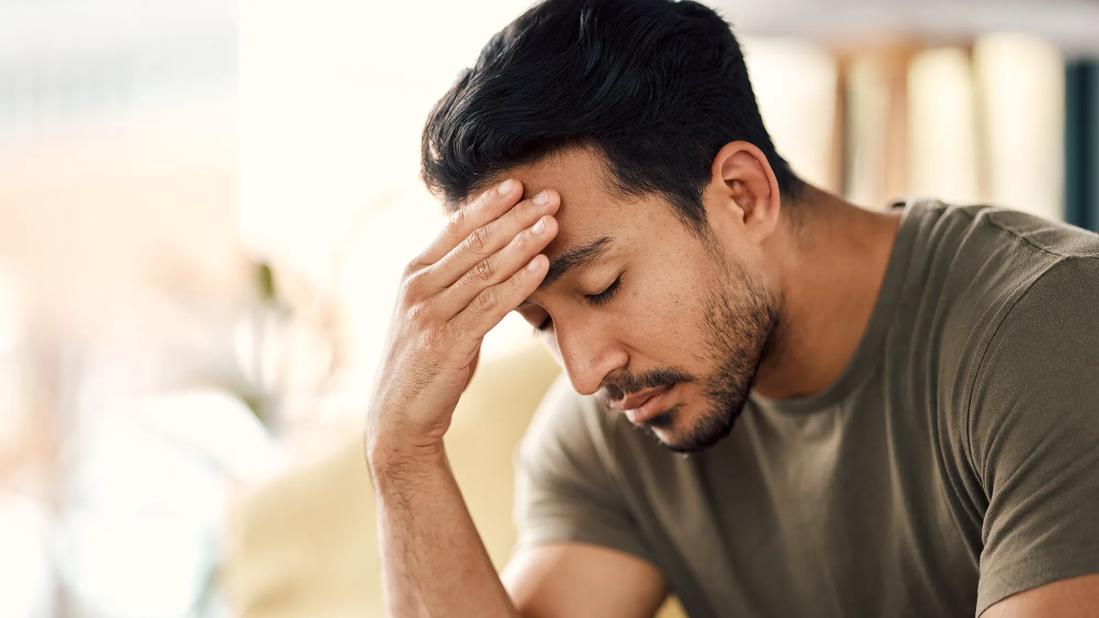Drowsiness is a side effect of inflammation, disrupted sleep and, sometimes, your allergy medicine

Image content: This image is available to view online.
View image online (https://assets.clevelandclinic.org/transform/5a14dc8e-652e-4e44-bece-973fb742d708/man-tired-brain-fog-1605237287)
Tired man with head in hand, eyes closed
When you hear the word “allergies,” you probably think of itchy eyes, a runny nose and uncontrollable sneezing — all things you’d expect to happen when your body’s trying to expel an allergen.
Advertisement
Cleveland Clinic is a non-profit academic medical center. Advertising on our site helps support our mission. We do not endorse non-Cleveland Clinic products or services. Policy
But what about feeling tired and fuzzy-headed? Why does that happen?
Allergist and immunologist Mark Aronica, MD, explains the relationship between allergies and fatigue.
Allergies cause fatigue because, for starters, your immune system expends a lot of energy responding to the thing you’re allergic to.
“Your body produces something called cytokines whenever you’re exposed to an allergen, like tree pollen, grass or mold,” Dr. Aronica says. Cytokines are proteins your immune system releases to help your body fight foreign substances. The cytokine release — paired with the release of other chemicals, like histamine — causes inflammation in your nose, leading to congestion and narrowed airways.
“You also produce them when fighting infections caused by bacteria, viruses and colds,” he notes.
During an allergy attack, your body is focusing its energy on responding to what it perceives as a threat, just like it does when you’re sick in bed. That’s why allergies make you tired: Mounting that immune response isn’t easy!
“People with allergies experience inflammation,” Dr. Aronica says. “That inflammation leads to nasal congestion, disrupted sleep patterns and not getting good rest.”
Advertisement
Fatigue isn’t the only symptom that can leave people with allergies stumbling through their day: Many also report struggling with “brain fog” — a hazy, tired feeling that makes it difficult to concentrate.
Dr. Aronica says brain fog is another side effect of allergy fatigue.
“Chronic inflammation from allergies can lead to that foggy feeling,” he explains. “The more fatigued you are, the more difficulty you’ll have performing well in school or work. It can also negatively impact your quality of life if you’re too tired to do things you would normally do, like work out.”
In a particularly cruel twist of fate, the same allergic reaction that makes you so tired can also make it more difficult to get the rest you need. That’s because histamines and cytokines play a vital role in regulating your body’s sleep-wake cycle. When an allergic reaction throws that delicate balance off, it can make it harder to fall and stay asleep.
In this way, allergy fatigue creates a vicious cycle. It interrupts your schedule during the day, which robs you of precious sleep at night. If, for example, you drink cup after cup of coffee just to get through your workday, you may find yourself buzzing at night, when you should be catching ZZZs.
Certain antihistamines — both over-the-counter and prescription — can cause drowsiness, making allergy fatigue even harder to shake.
Generally speaking, “second generation” antihistamines (like loratadine, fexofenadine and cetirizine) are less likely to make you sleepy. That’s because they were designed not to cross the blood-brain barrier as easily as their “first generation” forbears (like diphenhydramine, chlorpheniramine and hydroxyzine).
But even second-generation antihistamines can make you sleepy if:
If you think your medication may be contributing to allergy fatigue, ask your doctor or pharmacist about switching to another one — or whether it’s safe to take the medication before bed.
Advertisement
If your allergies act up and you feel the fog rolling in, Dr. Aronica says that a combination of medical treatments and lifestyle changes may help end the uncomfortable cycle of symptoms, inflammation and fatigue. He recommends that you:
Advertisement
Contact your primary care provider or an allergist if your allergy fatigue and brain fog aren’t improving. You may need additional testing or treatment.
Dr. Aronica also notes that there are other medical conditions that can cause fatigue and brain fog. Pay special attention to these symptoms:
“You could have a cold or another upper respiratory illness,” he says. “If that’s the case, you’ll need to take different medications to combat your symptoms.”
With your provider’s guidance and a little trial and error, chances are good that you’ll be able to get a handle on your symptoms — and save zombie-mode for Halloween.
Advertisement

Sign up for our Health Essentials emails for expert guidance on nutrition, fitness, sleep, skin care and more.
Learn more about our editorial process.
Advertisement
Most antihistamines, like Zyrtec, are OK, but avoid decongestants for at least the first trimester
You can now get lifesaving epinephrine in a nasal spray and prefilled syringes
If you’re sensitive to aspirin or other salicylates, limiting exposure is the best remedy
Mold exposure can cause allergic reactions, asthma and skin rashes
If allergies have you coughing and sniffling all night, try showering before bed, keeping the windows closed and propping your head up
If allergies make your mornings a slog, consider closing the windows and showering at night
When the trees start to bloom, your allergies can come to life — medications, closing the windows and keeping clean can help
Water, touch, sunlight, physical activity and cold are some of the rarest allergies
Although it could be used as a moisturizer, this new trend is not recommended
Communicating clear limits helps protect your time, energy and emotional well-being
High cholesterol can be genetic, but testing and treatment can lower your heart disease risk